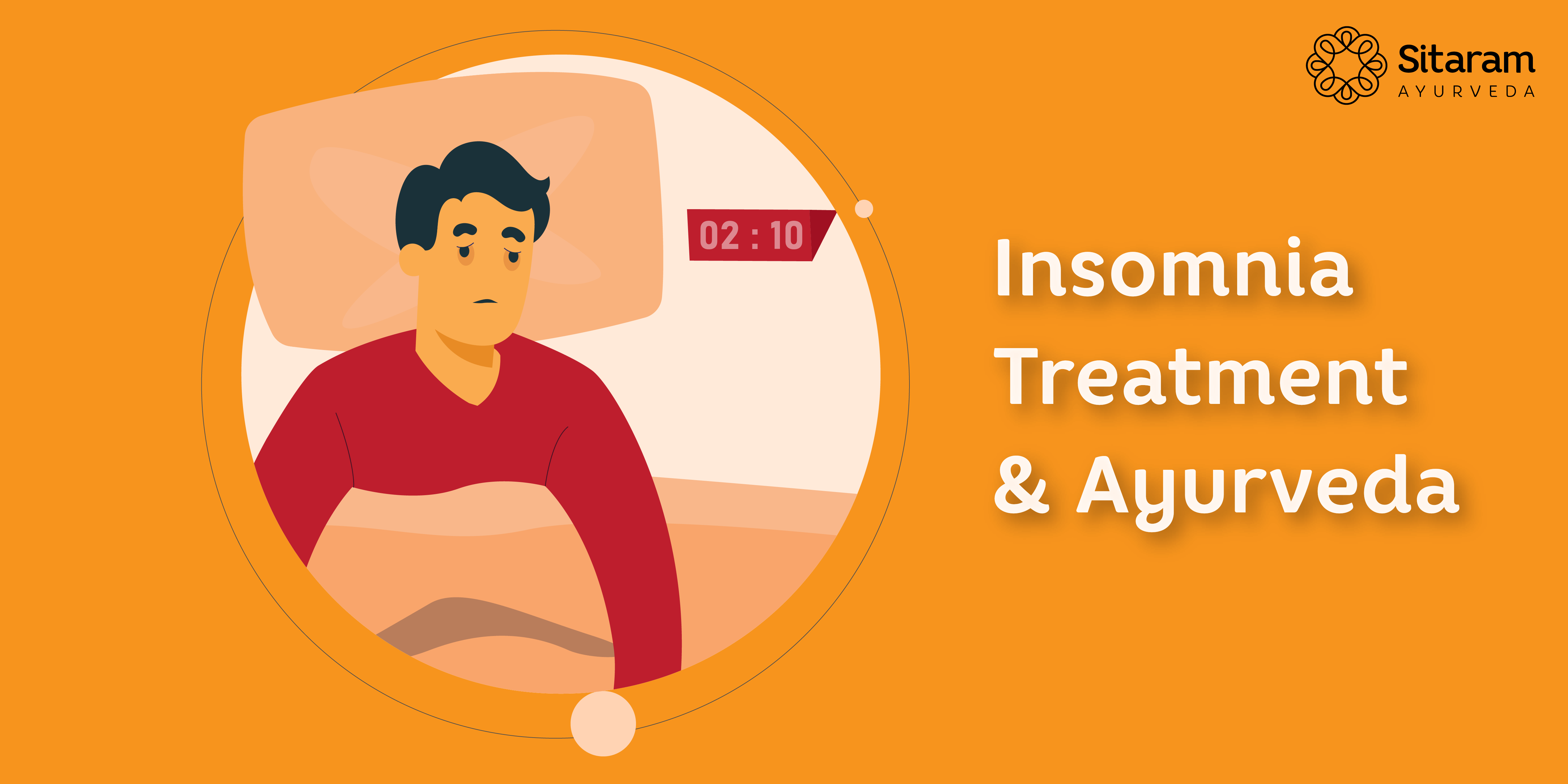Insomnia Treatment and Ayurveda

There was a time when sleep was thought to be a waste of time and people wished to be sleepless. Sleeping less was thought to help with working more and completing tasks before deadlines. But now everyone understands how important sleep is and is searching for a way to improve the quality of sleep.
Ayurveda can help you if you find it difficult to sleep enough or if you do not feel rested even after sleeping for a long time.
Why is Sleep important?
Proper sleep has more importance in your overall health than we may have probably thought about.
While sleep helps the body to scavenge inflammatory chemicals, toxins, and unwanted cells, reduced sleep will cause chronic inflammation which leads to reduced immune function.
The body is working during sleep to repair and rejuvenate itself for maintaining performance and attention on a coming day.
Six benefits of good sleep:
- Construction, Restoration, and Rejuvenation: Studies in animals and humans have found out that major restorative functions in the body like muscle growth, tissue repair, protein synthesis, and growth hormone release occur mostly, or in some cases only, during sleep.
- Cleansing of unwanted metabolic byproduct chemicals: Sleep is the time when the body gets rid of chemicals formed during normal physiological functions while we are active. For example, chemicals like adenosine formed during high brain activity are removed during sleep. New research also points to a special drainage system of the brain which flushes away these chemicals during sleep. (1)
- Memory and brain functions: It is now known that consolidation of memory takes place during sleep. That means information we gather is arranged during sleep for recalling when necessary.
- Anti-inflammatory effect: Proper sleep regulates inflammatory chemicals in the body and helps to reduce inflammations and aid in tissue healing.
- Improving immunity: Good sleep enhances the quantity and quality of cells and chemicals which help with immunity.
- Metabolic effects: Blood sugar and cholesterol regulation: Good sleep is important to maintain insulin sensitivity and normal levels of cholesterol and triglycerides.
Compromising sleep for long periods in life may lead to many unwanted effects and diseases.
Four risks associated with chronic sleep deprivation:
- Reduction in alertness: The brain’s ability to receive and react to information is reduced in chronic sleep deprivation. This can not only lead to decreased output and performance but is also found to be a leading cause of road traffic accidents.
- Memory issues and brain disorders: As memory is arranged during sleep, chronic sleep deprivation can cause reduced memory. Also the inefficiency of the cleaning system of the brain is related to development of diseases like Alzheimer’s.
- Metabolic disorders: Research finds that less sleep will increase insulin resistance and the risk of diabetes. Also bad fats like triglycerides in blood are raised if sleep deprivation is chronic.
- Chronic low grade inflammation and reduced immunity: Neglecting sleep over a long period of time will increase the inflammatory levels of the body. This is not only bad for joints and internal organs, but also reduces the resistance against infections and diseases.
15 tips for improving sleep:
- Sleep is a function of ‘kapha’ dosha. Kapha time of night is the first 4 hours or roughly 6-10 pm. So it’s better to go to bed at that time.
- Go to sleep at a regular time. Make a sleep schedule and adhere to it as a non negotiable habit.
- It’s better to go to bed and wake up early. Human beings are not nocturnal. Melatonin, the hormone associated with sleep is regulated in relation to darkness.
- Most people find it difficult to sleep because they do something mentally or physically stimulating. Reduce all stimulating activities after 7pm – physical and exercise, coffee, work, watching action movies and reading exciting books.
- Avoid day sleep.
- Have an early dinner, preferably 3 hours before sleep. Keep your inner light. Heavy stomach at night will prevent sound sleep. Avoid spicy food.
- Reduce liquid intake after 6 pm as you may wake up at night to pee.
- Avoid screen time after pm. Blue light from the screen keeps your brain active.
- Keep your bedroom and bed clean and devoid of all distractions.
- Avoid pungent smells and strong perfumes. Light scent of lavender and chamomile are known to improve sleep.
- Loud and fast music will prevent you from sleeping. Listen to slow calming music in low volume.
- Read a boring book.
- Listen to sleep meditations and yoga nidra.
- Rub ‘ksheerabala tailam’ on your palms feet and behind your ears to calm down the nervous system and initiate sleep. You can try plain coconut oil if ksheerabala is not available.
- If you have sleep apnea, panchakarma treatments like nasyam and Vamana can help.
Common medicines in ayurveda for stress and sleep like ‘swapnasap’ tablets, ‘pranah’ capsules, ‘manasamitra vataka’ etc are found to be very effective to improve both the quality and duration of sleep, in our clinical practice.
Other herbs which help in improving sleep includes ‘tagara’ (Valeriana wallichii), ‘aswagandha’ (Withania somnifera) , ‘sankupushpi’ (Clitoria ternatea), ’brahmi’ (Bacopa monnieri) etc.
It is recommended to do consultation with a qualified ayurvedic doctor before you start any ayurvedic health care products for sleep or buy ayurveda sleep medicine. You may even make use of online consultations from any of the few reputed firms who offer Ayurveda treatments online.
Feel free to comment below if you have any questions or suggestions about the information given above.
References:
- http://healthysleep.med.harvard.edu/healthy/matters/benefits-of-sleep/why-do-we-sleep


 Sign In
Sign In Cart
Cart